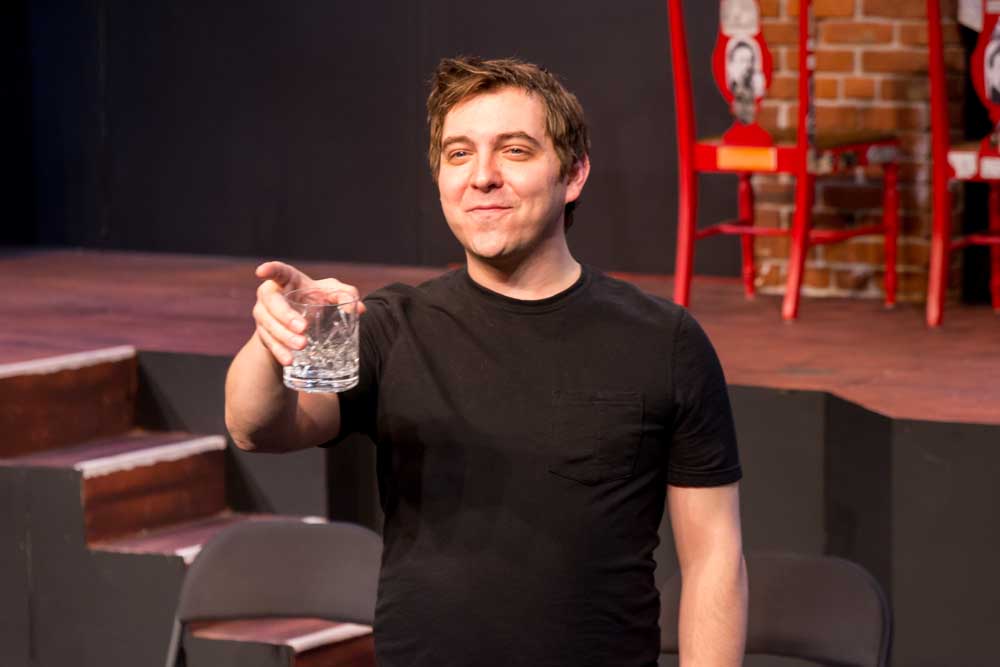‘Stupid F—ing Bird’ lands in Bend
Published 12:00 am Thursday, March 28, 2019

- Brad Ruder as struggling young artist Conrad in "Stupid F---ing Bird," by Aaron Posner. (Arton Photography / Submitted photo)
Before we talk about “Stupid F—ing Bird,” Aaron Posner’s provocative and moving adaptation of Russian playwright Anton Chekhov’s “The Seagull,” we might as well talk about F-bombs. As it suggests in its title, a flock of them drop in “Stupid F—ing Bird,” opening Thursday at Cascades Theatre in Bend.
According to director Carolyn Graham Tsuneta, there are well over 100 of them deployed throughout the show (yes, someone counted). Consider yourself notified. As a crew member remarked before a rehearsal last week, it’s better to warn folks of the language in advance than watch them walk out during the first act.
Trending
Those whose sensibilities are not so delicate that they steer clear of cutting-edge theater are in for a wild ride with “Stupid F—ing Bird,” part of Cascades Theatrical Company’s Black Box season. Think of it as a parallel season, flying perhaps a little more below the radar and boasting black walls and simple sets — the backdrop here is a painting by multitalent Jason Graham, Graham Tsuneta’s son. Her husband, Thomas Tsuneta, designed the set. Energies are instead poured into the not-so-simple plays, tending toward crackling dialogue and sharply drawn characters.
With “Stupid F—ing Bird,” expectation is set on its ear from the start, with Conrad (played by Brad Ruder), telling the audience, “The play will begin when someone says, ‘Start the f—ing play.”
What follows is a meta play that, even as the heart-wrenching plot unfolds, pauses now and then to reference itself as characters break the fourth wall. Despite any real or perceived winking playfulness, “Stupid F—ing Bird” never fails to transmit real emotion. Moments of “actually actual” conversation with the audience is followed moments later by a line delivered in character like a left-hook.
If you’re familiar with “The Seagull,” you’ll recognize a similar shape. The description on the back of the Posner’s play calls it a “very funny remix.”
“The way Posner did it, he really distilled it,” director Graham Tsuneta said. “He took it from four acts to three acts. He took it from 13 characters to seven characters.”
Ruder’s Conrad (AKA Con, Connie) is the pivotal role. Conrad is a young playwright trying to emerge from the long shadow of his mother, famous actress Emma Arkadina (Annie Tappouni). She had Conrad when she was just 18, and claims, “I’m doing the best I can,” which should be the official motto of those who do the ones they love wrong.
Trending
“Emma Arkadina is … absolutely full of herself, and has no concept that anything she’s doing is ever wrong. She’s never apologized for anything in her whole life,” Graham Tsuneta said, saying she can’t wait for people to see Tappouni in the role. Indeed, she and the rest of the well-cast performers make their roles memorable.
Conrad is in love with Nina (Audrey Rink), his only muse and star of a one-woman show by Conrad. Unfortunately, Trigorin (Joshua Curtis), a writer of great renown and suitor of Emma — and whom Con finds hilariously and contagiously insufferable — is also bewitched by the emerging starlet.
Even on paper, it’s easy to feel Con’s jealous, bitter unease about the unraveling situation.
The cast is rounded out by Sorn, Dev and Mash. Dave Felton plays Sorn, Conrad’s wise and lonely uncle, a doctor who aches to be noticed, and to feel something as strongly as he did in his youth.
Actor Michael Nowak appears to be having a blast as Dev, and pulls double duty as the show’s light designer. Dev is unflappably upbeat even as his love for chronically dour Mash goes unrequited. Mash is played by Prairie Emrich, who in addition to other duties, sings a few trenchantly biting songs (yes, there are songs in the show, too). She observes such existential facts as “you’re hot, you rot and then you’re done,” and ask probing questions like, “What could be harder than life?”
Mash is in love with Conrad, who’s so immersed in his jealousy and implosion he doesn’t notice. And round and round we go.
There’s something completely absorbing about a play in which the outcomes for the characters, who struggle and strive to find love and meaning, starts to feel like they actually matter. Conrad yearns for a new kind of play in which something real happens, from which people emerge truly transformed. If “Stupid F—ing Bird” falls short of that goal, it comes pretty f—ing close.








